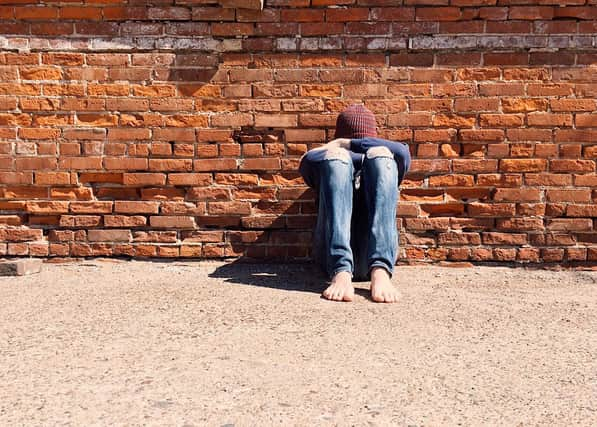'I felt utterly hopeless': Why a generation of younger Scots are struggling under multiple Covid lockdowns


Before the first official lockdown in March last year, I was, for the first time, receiving medical treatment for depression.
My issues stemmed from as young as 15 when what I thought were typical teenage insecurities resulted in disordered eating behaviours that I still manage today.
Advertisement
Hide AdAdvertisement
Hide AdI didn’t know how to seek medical help at that age and I dismissed how I felt because I thought I was probably fine.
The most prominent personal problem I’ve dealt with since then is reoccurring loneliness, which led to depression. Lockdown heightened this to an unbearable level and paired with the lack of purpose and responsibility I was experiencing, I felt utterly hopeless.
According to the Office of National Statistics, in a report published pre-pandemic in March 2020 on young people’s well-being, there has been a noticeable decline in young people’s satisfaction with their health in the UK in the past five years.
Roughly 52 per cent of people surveyed between the ages of 16 and 24 said they were mostly or completely satisfied with their health in 2017/18, which was a drop from 59 per cent the year before.
Nearly a third of young women, 31 per cent, reported some evidence of depression or anxiety in the same timeframe, which was an increase from 26 per cent the previous year.
To me, the difference for us as young adults to other age groups in the pandemic is that we are at the stage in our lives where we are supposed to be forming connections and coming into our own as adults in the ‘real world’.
It’s such a formative time in our development that has just been thrown into limbo.
I don’t have kids that need me or a partner I can offer support to or receive it from. Until recently, having just graduated, I didn’t have financial security or job prospects.
Advertisement
Hide AdAdvertisement
Hide AdI had no reason to get up in the morning. Nothing would happen if I just didn’t make the effort.
That fact is one that hit me hard on an almost daily basis.
The pressure of having others relying on you during this must be terrifying, but I would be lying if I said I'm not envious of those who have personal connections, ones that I hope to have in later life, to fall back on.
That is personal to me. I won’t claim everyone wants a sense of responsibility in that form, but I do know the feeling of hopelessness is a common result of the lockdown among young people.
My best friend was diagnosed with severe depression and anxiety in October last year.
Despite a history of depression, she was coping until lockdown hit, but now she echoes my thoughts of feeling stuck and hopeless amid the instability.
She worked in hospitality, in what she referred to as a filler job that was only supposed to be a part-time role during university, but it is now her main source of income.
In September, she faced dozens of rejections when applying to rent flats as she couldn’t prove a steady source of income and ended up staying at a friend’s place for almost a month.
Symptoms of her depression included suffering from insomnia and having panic attacks throughout the day and night.
Advertisement
Hide AdAdvertisement
Hide AdThis is when she spoke to her GP, she told me: “I was prescribed beta-blockers, given links to online support, meditation apps, tips for sleeping and some names of clinics where I could apply for counselling.”
She is on a waiting list for one clinic that was suggested, but hasn’t heard anything since she registered in mid-October.
Another of my close friends, someone I grew up with, was diagnosed with anxiety over a decade ago when he was just 13, but had managed to avoid the associated diagnoses of depression until last year.
He graduated from university in July and said he felt nothing. Four years built up to the moment when he opened a letter on his couch.
In summer, after working for a company that shattered his confidence within days of starting, he quit and restarted his job hunt. He told me: “What was worse was that I was back to square one with the added feelings of hopelessness and abandonment.”
At the moment he is waiting on a follow-up GP appointment to figure out how to move forward after spending his first ever Christmas away from home, just weeks after being diagnosed with depression.
While I understand I am generalising, I think that it’s a fair observation to say that young adults lack the support structure that typically comes with age.
I see the term ‘resilience’, or lack thereof, used a lot in this conversation.
Advertisement
Hide AdAdvertisement
Hide AdWhy are we so fragile when other generations seemed to manage alright?
Even without the pandemic, we are living in a completely different landscape to previous years, where we are constantly reachable and almost never switched off.
It’s impossible to compare it to that of life a decade or two ago.
Success in our society means joining the ‘Rat Race’, as someone I was recently speaking to so eloquently put it.
We study to get a job, so we can earn money to buy a house, to raise a family in.
I don’t necessarily have an issue with that structure, but I do think it’s vital for observers to understand that suddenly, because of the pandemic, we are all scrambling to join the race as opportunities dwindle and the economy gets even harder to stay afloat in.
When you see statistics that suggest young adults are increasingly dealing with depression, try to remember unless you are one, you can’t weigh up our experiences with your own.
Our possible lack of responsibility doesn’t equate to an easy life and you shouldn’t think poorly of us for struggling.